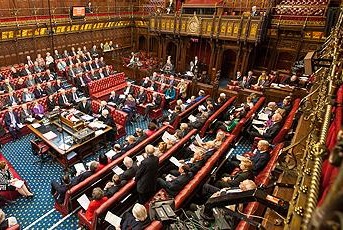Major new report published following inquiry into UK's family migration policies by Justice and Home Affairs Committee
The House of Lords Justice and Home Affairs Committee yesterday published an important new report following its inquiry into family migration in the UK.
 Image credit: UK GovernmentThe 80-page report can be downloaded here or read online here.
Image credit: UK GovernmentThe 80-page report can be downloaded here or read online here.
For its inquiry, the Justice and Home Affairs Committee said it looked at family migration policies in the widest possible sense, including the general trends in the design of family immigration pathways, similarities and discrepancies across them, how migration policies affect families, and how family migration policies affect society.
Yesterday's report presents the results of the inquiry. It is highly critical of the Government's current family migration policies, finding them to be overly restrictive, complex and inconsistent. The Committee says the policies fail both families and society.
The report states: "Families are failed. The desire to join family members is natural and understandable, but the Immigration Rules force families to live apart. The Home Office portrays family separation as a choice on the part of the family— we profoundly disagree that it is a matter of choice. The arrival of spouses and partners of British citizens is deterred or delayed by the financial requirement and prohibitive application fees. Sufficient income may never be secured. Parents are forced to raise children alone, until they can be joined by their foreign partners. Children grow up without one of their parents."
The Committee says it does not believe that the Immigration Rules adequately respect the right for families to be together.
British citizens, refugees, and permanent residents are all affected by restrictive rules and deficiencies.
Baroness Hamwee, Chair of Committee, called the policies "extreme" and added: "It is virtually impossible to be joined by an elderly parent who needs care. No visa was issued to anyone in that situation in 2021. Tight but fair immigration rules should allow families to live together."
The House of Lords Justice and Home Affairs Committee highlights that applying for a family visa is a slow and expensive process.
"The Home Office is systematically deficient in its processing of family visa applications. Delays pile up, communication is appallingly poor, evidential requirements are excessively complex, and fees prohibitive. Applicants are left distraught," the report explains.
As the report spells out, a common thread that ran throughout the Committee's inquiry was the distress of separated families.
"We were told that the experience of the family reunion application process was 'often a lengthy and traumatising process in itself' and that it involved 'stress, depression, other diagnoses and worsening of existing conditions … and impacts on physical health and wellbeing including insomnia, panic attacks, alcohol misuse, hair loss, and weight issues.' Several witnesses also mentioned the 'crippling financial costs' that threaten to push families into destitution and force some to alter their career and other life plans."
Delays in the Home Office's processing of applications adds to predicament of families, placing them in great uncertainty.
In addition, the Committee criticises the standard of communication by the Home Office during the process: "The Home Office does not proactively provide updates, and applicants find it difficult to seek, let alone find, information of their own initiative. Poor communication adds to the uncertain, stressful, and precarious situation of families. It also affects cooperation between the Home Office and local authorities."
While demand for legal advice is high due to the complexity of immigration law, the Committee noted that many families struggle to access good quality advice, leading to potentially serious adverse consequences.
The report comments: "Lack of access to high quality, affordable legal advice can have dire consequences. Witnesses highlighted the risk of 'becoming inadvertently undocumented due to a lack of good quality, freely accessible immigration advice and representation'. Reunite Families UK said that they have members who, unable to afford legal advice, attempt to navigate the rules on their own, leading to major mistakes. Where families have mixed immigration statuses, the residence of one member may inadvertently become unlawful. Witnesses saw the lack of legal provision as contributing to increased numbers of people without status, increased poverty and destitution, and knock-on effects for local authorities and other services who have to provide support, particularly when there are children. Inability to access timely and good quality legal advice risks even more grave consequences."
The combined impact of overly restrictive family migration policies is an undermining of society.
"Current policies fail in their objective of promoting social cohesion. They separate families and generate tensions between families and society. The evidence we received demonstrated that even when family members are allowed to live together, applicants and sponsors can feel like second-class citizens and are reluctant or unable to take full part in British society before reaching settlement," the Justice and Home Affairs Committee stated.
A number of recommendations are made in the report, with the Committee calling on the Government to revisit its policies to ensure that they are sufficiently protective of family life. The Immigration Rules should be simplified, and the Home Office is urged to improve its processes and raise its standards of service.
The Committee also recommends improvements to the availability of legal advice and aid, stating: "The Home Office should support legal practices and charities to provide accessible, good quality legal advice at all levels. […] The Government and professional bodies should work together to promote wider awareness and crossover expertise between family and immigration law and encourage efforts to better signpost the expertise available. […] Subject to usual eligibility criteria, legal aid should be available to those making a visa application involving a child or making a complex application for a family visa. Legal aid should also be available to those appealing against a decision on a family visa application."